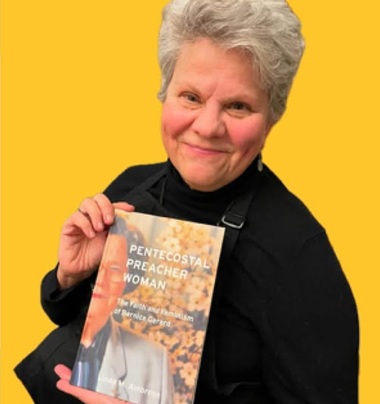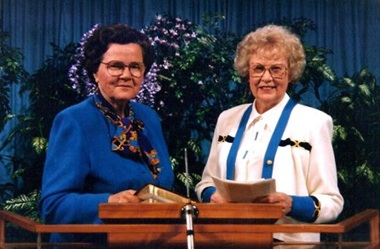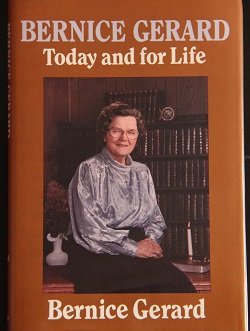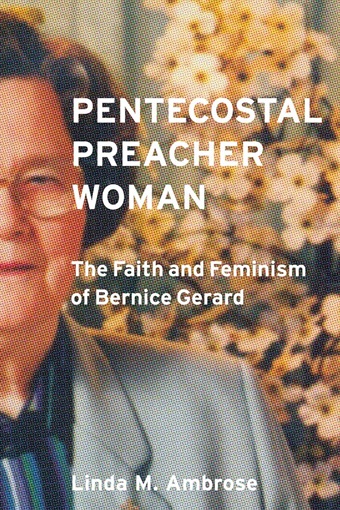
Linda Ambrose won the BCHF Lieutenant Governor’s Medal for Historical Writing for ‘Pentecostal Preacher Woman.’
Bernice Gerard (1923 – 2008) was one of a kind – a Pentecostal preacher, a feminist, a talk show host, a politician and an ecumenist.
Vancouver Sun religion (and more) columnist Douglas Todd put her right at the top of his list of BC’s most influential spiritual leaders of the 20th century, after consulting with scholars of religion and other authorities.
Gerard probably isn’t as well remembered as she should be, but a new biography will help to remedy that – especially now that it has won a significant award.
UBC Press published Pentecostal Preacher Woman at the end of 2024, and last month the British Columbia Historical Federation named it the 2024 winner of the BCHF Lieutenant Governor’s Medal for Historical Writing.
A May 26 Facebook post on the BCHF site noted:
Based on Reverend Gerard’s personal archives and life writing, the book foregrounds her own voice to trace the complex evolution of a conservative woman’s ideas about faith and society.
Ambrose, also received a 2024 Research Excellence Award from Laurentian University in Ontario, where she is a professor.
She also won the 2025 Clio Prize (British Columbia), awarded by the Canadian Historical Association.
Controversial figure

Media coverage was often very negative. Image from YouTube video
Those who do remember Gerard will be most likely to recall her foray into foreign territory on the west side of Vancouver.
Much to the surprise of nude bathers at Wreck Beach, she and a doughty band of followers turned up in person during the summer of 1977 to protest a practice she thought might spread to other beaches.
She was widely derided for her troubles, receiving scorn from all sides in the media, from political leaders and the general public. As a young Point Grey, non-Christian resident – though not a habitue of Wreck Beach, I might add – I was, alas, very much one of the crowd.
Indulging in a brief personal (slightly relevant) aside, it turns out that I was at that time hitch-hiking through Zambia, where I became a Christian.
My farmer/missionary hosts urged me to go to L’Abri in Switzerland, saying I was asking too many questions. Francis and Edith Schaeffer ran a lovely community in the Alps which encouraged seekers or newcomers to the faith to ask anything they liked.
I well remember challenging the table hosts about public nudity, raising Wreck Beach as a positive example. I can’t recall their response, but it probably had something to do with modesty.
Returning to Vancouver as a Christian (and blessed to have met my wife Margaret at L’Abri), I was fortunate enough to come to know Bernice in person, as she was on the board of Christian Info Society, which published BC Christian News, where I worked for many years.
Meg Johnstone interviewed Bernice Gerard for the December 2000 issue of BC Christian News. One thing Bernice said:
We may see a great turn-around . . . I’ve never felt that we have to win, but we have to stand up. . . . Biblically, we’re given an opportunity to act and give our witness, but we don’t guarantee that we have to be successful. I feel strongly that we need to take our place in the community and do whatever we have to to witness, let our light shine.
I don’t believe we ever discussed public nudity and I remember her as an intelligent, principled and responsive Christian leader.
In fact, Ambrose pointed out during a recent talk (see below), that despite being perceived as a middle aged prude, “Bernice Gerard went on air – late night phone-in show – and she said, “Call me, ask me anything.” And they did.
Gerard also attracted considerable attention, often not positive, during her tenure at a Vancouver city councillor from 1977 – 1980. But there was much more to her than the portions of her life that made the news.
Who was she?
Speaking at the BC Historical Federation’s annual conference in May, Ambrose described the “elevator speech” she gave to her 12 year old granddaughter when she asked what the book is about.
She began:
After some discussion of the Wreck Beach incident, Ambrose continued:
So what is it about Bernice Gerard then that would cause Douglas Todd of the Vancouver Sun to say she’s the most significant spiritual leader of the whole 20th century for British Columbia? Really, what did she do? . . .
People do remember her most from the 1970s I would say, and the 1980s. Wreck Beach was one of her causes, but it wasn’t the only one. She was a very vocal anti-abortionist who described herself as a feminist. Okay, that’s a bit of cognitive dissonance for me . . .
But she insisted she was a feminist and she insisted that abortion was not okay. Her argument about that is quite complex and I won’t get into it tonight, but she always prefaced her remarks about abortion saying, “If abortion had been available when my mother was birthing me I wouldn’t be here.”
As Ambrose said, the reasons are complex, but relate to the fact that her mother was held in a mental institution. She described how, following the birth in New Westminster – “in a story that’s very much a reverse of everything we hear about indigenous children and the 60s scoop” – a “Stolo woman living on the Fraser River married to her fisherman French Canadian husband” took her home. The Gerards later adopted her.
Her adoptive mother died when Bernice was just three, and she was “farmed out” to various relatives by her father, who also abused her – then she had a dramatic religious conversion at the age of 12 through a couple of “preacher women.”
That religious conversion became the very centre of her identity and as she was placed in other foster homes throughout her growing up years she really fought for her faith, in the sense that her caregivers were mostly middle class mainline Protestant homes – good Anglicans, Baptists, Christians of various stripes – but Bernice had a Pentecostal foster family and she experienced what Pentecostals describe as the baptism of the Holy Spirit.

Bernice Gerard and Velma (McColl) Chapman were life-long ministry partners.
Gerard was always very active. As her memorial stated upon her death in 2008:
Settling in Vancouver, Bernice hosted the Christian talk-show Encounter on CJOR and with Velma Chapman (nee McColl), established the Sunday Line Radio and Television Ministries, founded Fraserview Pentecostal Church on Victoria Drive and co-founded Pacific Academy.
She was also a founding member of Pro-Life BC and a good friend of the Jewish community.
Bernice earned a Master of Arts degree at UBC and was the first Pentecostal Chaplain at Simon Fraser University and the University of BC where she participated in the establishment of the Charismatic Christian Fellowship.
Her Master’s thesis was on ‘[John] Milton’s Orthodoxy and its Relationship to the Form of Paradise Lost.’ Ambrose said, “She regarded Milton as a bit of a role model because she wanted creative ways to present the gospel on the campuses of UBC and Simon Fraser.”
Moving on to themes in Gerard’s life, Ambrose said:
Chapter 8 is called ‘Challenging Patriarchal Authorities.’ She got herself in a lot of hot water with the boys back at denominational headquarters in Toronto. She got in hot water because Pentecostals did not ordain women, not until the late 1980s
But she’d been on the road preaching and ordained since the 1940s, so she had no patience for these pedantic debates about whether or not women could actually be preachers. She’s like, I just am one, whether you like it or not it was God’s idea not mine. That’s the higher authority than you; I’m over it, I don’t want to argue with you.
The other thing she got into hot water about was working with Catholics.
Noting that cooperation between Catholics and Protestants was rare, Ambrose said:
Bernice Gerard did that because the charismatic movement was beginning and this was a social cultural phenomenon where not just Pentecostals but Christian churches of all stripes started to have an experience of what they said was the presence of the Holy Spirit . . .
She said “If they could see me in these smoke filled rooms with Catholics praying, seeking the Holy Spirit, I’d be in really hot water.”
See above for Ambrose’s YouTube talk.
Complicated
Burton Janes reviewed Pentecostal Preacher Woman in Faith Today, saying, “perhaps ‘complicated’ is the operative word in trying to understand Gerard.”
He added that “some may even wonder why she remained rooted in various religious institutions, including the Pentecostal Assemblies of Canada.”
 He captured her determined personality and the book’s success in portraying her complex persona:
He captured her determined personality and the book’s success in portraying her complex persona:
Gerard wrote two autobiographies, Converted in the Country (1956) and Bernice Gerard: Today and for Life (1988).
In the latter book, she wrote, “God said, ‘Go!’ Church leaders in all too many cases said, ‘No!’” She always pushed back hard against her critics.
“It is no secret,” she continued, “that women have had to struggle for recognition of their full personhood; what is surprising is that the church with all its respectability is in so many areas the last bastion for male chauvinism.”
She admitted the question of women in ministry is far from being a simple one. She criticized the people who claimed “it’s a man’s job, so get out of the pulpit!”
She had “no time for debate with those who raise the subject of women’s ministries with the intent to silence or harass women.” She had “been endlessly challenged, questioned, cajoled, condemned, and alternately complimented and commended.”
She saw herself as “a person created in God’s image whom he wants to make free to be whole, to grow, to learn, to utilize fully the talents and gifts God has given her as a unique individual.”
Ambrose bases her book on Gerard’s sermon notes, personal archives and life writings. She allows her subject to speak in her own voice as she traces her evolving life journey. Ambrose concludes, “When we make meaning from our life stories, it’s complicated.”
Go here for the full review. And here for a write-up Lloyd Mackey did about Bernice Gerard, with considerable input from Linda Ambrose, for Convivium, now in the Cardus archives.
Final thoughts
Ambrose said at the end of her talk that “there’s a lot of BC in BG,” noting that several key themes in her biography of Gerard “touch on aspects of BC history,” and are still important issues:
- the history of adoption and child welfare in this province;
- faith and feminism; women and ministry;
- same-sex relationships;
- secularization and irreligion;
- the religious right in Canada.

Version 1.0.0
Ambrose concluded Pentecostal Preacher Woman by writing about her trek to Wreck Beach in the spring of 2019 (clothed, as she confirms in her talk):
I went there because I wanted to put myself where Gerard had been. I wanted to imagine what she might have been thinking on that summer day in 1977 when she made her silent protest.
I was trying to understand the firmly held convictions that caused her to do something so public and so dramatic, especially when she knew she would endure a good deal of mocking afterward. . . .
In the end, Gerard took a moderate stance on the Wreck Beach question, respecting that those who enjoyed the clothing-optional beach had every right to do so but also insisting that Vancouverites who wished to stroll along other public beaches should not have to worry about unexpected encounters with naked people. . . .
I took three smooth stones from the beach that day as a souvenir: a white one, a black one and a grey one. Those little stones now sit on my desk. They remind me that when I am writing history, things are rarely black and white. There are always more than two sides to every story.
Spending all this time with Bernice Gerard and her life stories, I have come to realize that the same thing is true when we craft our own inner narratives too.
Ambrose has been working on these issues for a long time. For a some more insights into her reasons for writing about Bernice Gerard, you could check out:
- CBC News interview (July 7, 2016): ‘Laurentian historian Linda Ambrose tracks role of women in Canada’s Pentecostal movement’
- Abstract of an article by Ambrose in Gender & History, 2022, 34(2): ‘A Messy Mix: Religion, Feminism and Pentecostals’
There are gaps in the book. She doesn’t mention BC Christian News, for example. Nor does she say anything about Bob Birch, with whom she led the charismatic movement in Vancouver.
However, Ambrose very much deserves her award and this book would be beneficial for any believers, but also for those in the broader community, and across the nation.

Dr. Ambrose’s excellent biography did have the odd “gap” and for good reason. The book was about a Pentecostal preacher. BC Christian News, on whose board the Rev. Gerard served with distinction, for several years, encompassed not only Pentecostals but non-charismatic evangelicals, mainstream Protestants, many Catholics and Orthodox – and probably a few more categories.
As founding editor during her time on the BCCN board, I found her congenial, open, gracious and intellectually stimulating.
One example of her ability to reach out: Around 1993, Philip Owen became mayor of Vancouver. Mr. Owen was a lifelong Anglican who experienced spiritual renewal at the nudging of his rector, an evangelical Anglican, the Rev. Harry Robinson.
Ms. Gerard, who had been on city council for several years and knew her way around civic politics, arranged a ‘laying on of hands’ ceremony for Mayor Owen early in his term. It brought together about 100 Christian leaders and was held, appropriately, in the ‘upper room’ of Canadian Bible Society’s building on Kingsway at Fraser. Her faith perspective and political skills brought together an event which drew on the ordination and blessing ceremonies of several Christian traditions and denominational streams.
Further, I believe, as a journalist observing the event, it provided for the new mayor, a sense of spiritual confidence that helped him to become one of the west coast’s most effective politicians within living memory.
Thanks, Bernice.